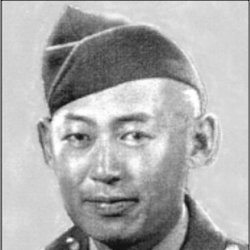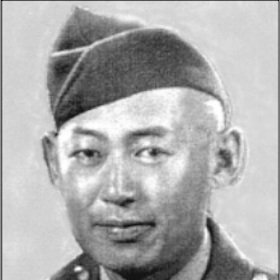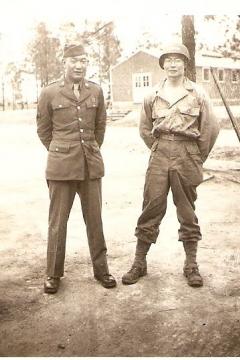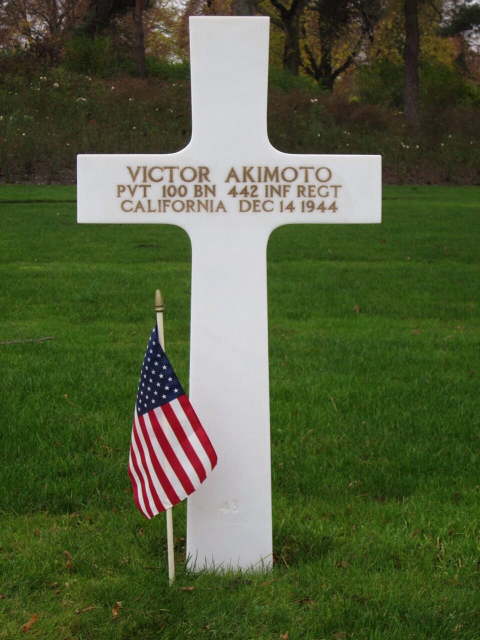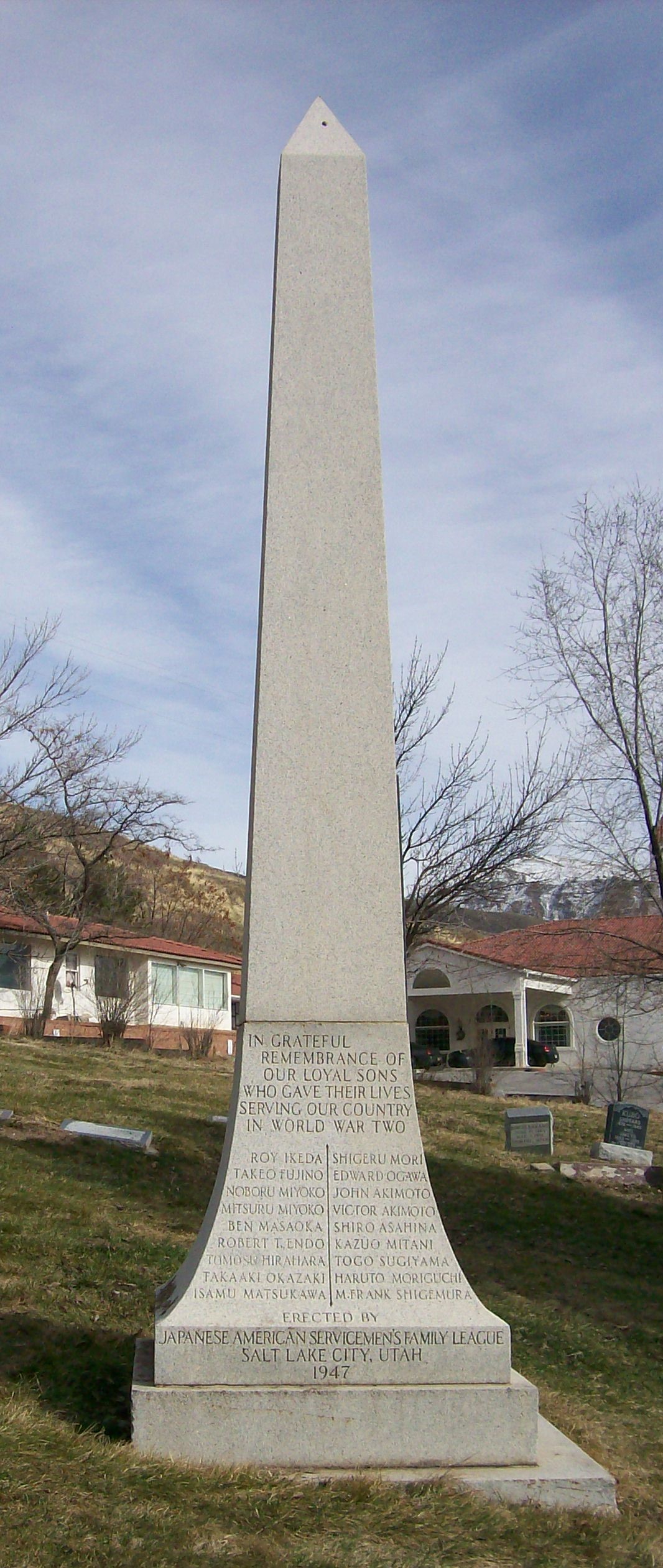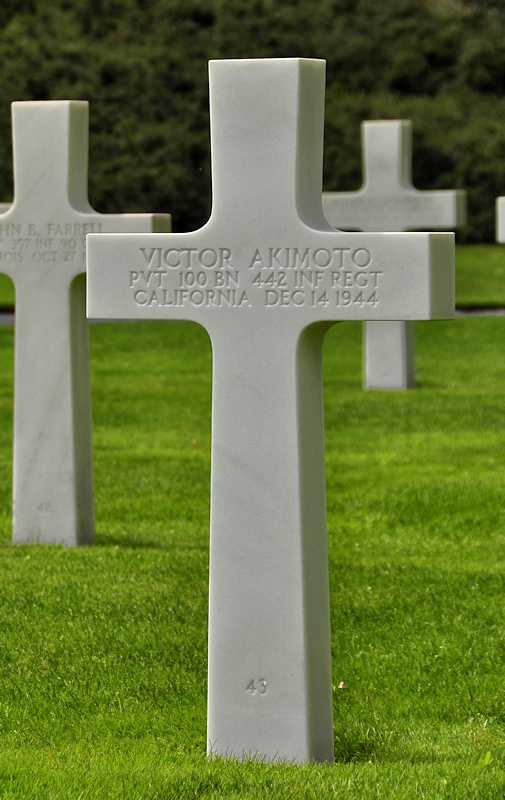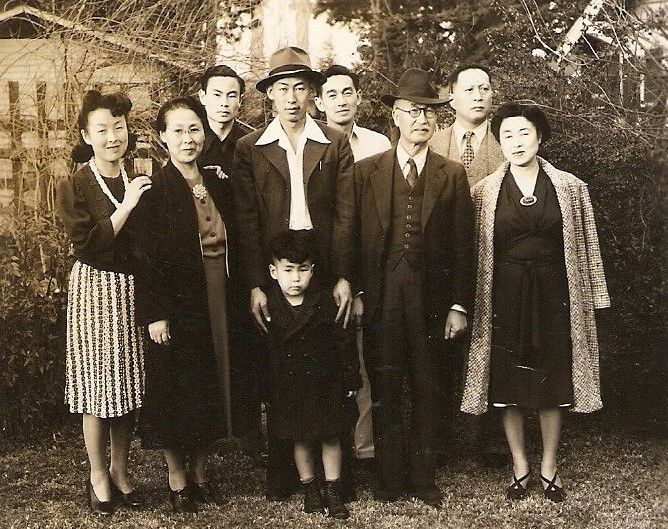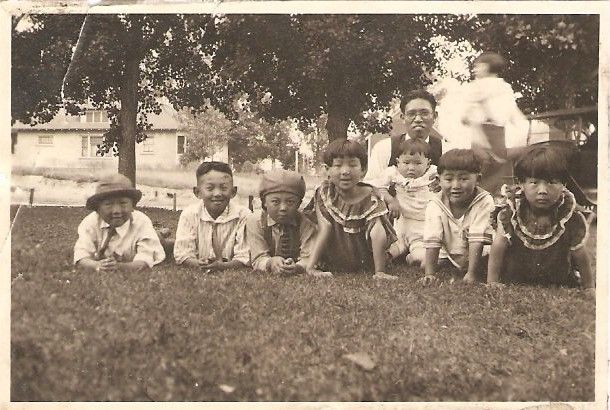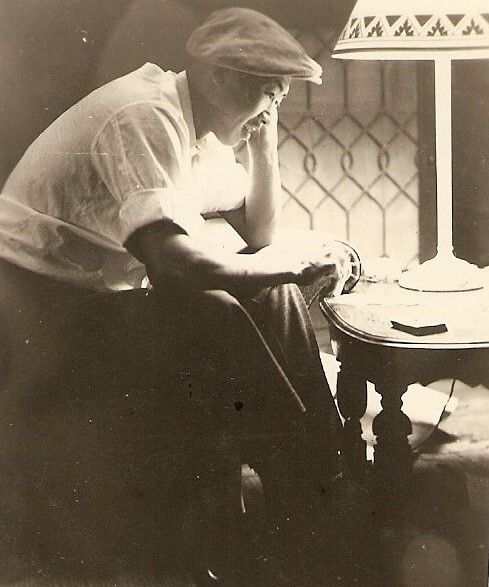BATTLE WOUNDS FATAL TO S.L. SOLDIER
Pvt. Victor Akimoto, 26, son of Mr. and Mrs. Masanori Akimoto, 903-3rd ave., died Dec. 14 in a German hospital of battle wounds. He had been reported missing in action in France since Oct. 23.
He is the second son to be killed in action, Pvt. John Akimoto, 20, having been killed in Italy last July.
Victor was cited in July, 1944, for capturing four nazis while unarmed in Italy. A technical sergeant while in training in the United States, he voluntarily gave up his stripes to join the Japanese-American 100th infantry battalion as a private in order to see combat.
Survivors include his parents; four sisters, Jane Akimoto and Mrs. Margaret Kajikawa, Salt Lake City; Mrs. Martha Hamlett, Chicago; Mrs. Ruth Kodani, Denver; two brothers, Ned Akimoto, Chicago, and Ted Akimoto, officer candidate, Fort Benning, Ga.
Submitted by
Eric Ackerman
--------
Before the War
Victor Akimoto grew up as the fifth child in a large Japanese-American family of eight children during the 1920s and 1930s. Victor had three brothers and four sisters. His father, Masanori, managed the Utah-Idaho Sugar Company operations near Idaho Falls, Idaho.
Victors mother, Mary Miki Shiratori Akimoto, was a homemaker. In 1928 the family moved to Los Angeles, California to get better healthcare to deal with Victors sudden onset of alopecia, or hair loss. Masanori Akimoto went to work as a life insurance salesman.
Growing Up in Los Angeles
Victor attended 36th Street Elementary School, graduated from Foshay Junior High School, and then attended Jacob Riis High School. He excelled at sports including basketball, football, and boxing. Described by his brother, Ted, as the leader of everything, Victor worked at a variety of odd jobs including delivery driver, fruit stand attendant, and wholesale market worker.
Military Experience
Victor enlisted in the U.S. Army on January 27, 1942. He was initially assigned to Fort Warren, Wyoming for basic training where he learned how to drive military trucks. He quickly moved up through the enlisted ranks from Private, to Platoon Leader, and then to Private First Class. In January 1943, President Franklin D. Roosevelt authorized the formation of an all Japanese-American unit. Victor jumped at the opportunity. Before transferring to Camp Shelby, Mississippi to join the 100th Infantry Battalion from Hawaii and the 442nd Regimental Combat Team, Victor was promoted and earned his sergeants stripes. Brothers, Johnny and Ted, met Victor at Camp Shelby once they had enlisted in the U.S. Army.
Training at Camp Shelby
At Camp Shelby, Victor and his brother, Ted, were not on the list to go overseas, but their youngest brother, Johnny, had received his orders. Victor and Ted, as non-commissioned officers, were to remain behind to help train new recruits. Victor knew that the company chaplain could help persuade the regimental commander to let him go overseas. Victor requested to be demoted to private in order to join his brother. The Commanding Officer, impressed with Victor's willingness to fight, gave him permission to go once Victor gave up his stripes. With the demotion, Private Victor Akimoto joined his younger brother, Johnny, on their voyage to Europe.
Battlefields
Victor fought in a variety of battles in Italy including Anzio, Pian Marano, Hill 415, Belvedere, Sassetta, Cecina, Castellina, Pastina, Orciano, Livorno, Pisa, and Lucca. He also served in a number of battles in France including Bruyères, Belmont, and Biffontaine.
Near Biffontaine, the Germans had surrounded members of the 141st Infantry Regiment, a unit mostly from Texas, for nearly a week. Victor's regiment made several attempts to help rescue this Lost Battalion before the regiment finally succeeded. This was one of the bloodiest battles undertaken by the Regimental Combat Team. The Germans captured Victor on October 24, 1944, and he eventually died of his injuries at the Bad Ord Prisoner of War Camp Hospital in Germany on December 14, 1944.
Commemoration
Victor was awarded a Purple Heart, Combat Infantrymans Badge, Bronze Star, Distinguished Unit Badge, three Presidential Unit Citations/Distinguished Unit Badge, Expert Marksman Badge, European-African Middle Eastern Campaign Medal, and a Victory Medal. Victor's contributions helped the 100th Battalion/442nd Regimental Combat Team receive over 18,000 individual decorations making them the most decorated unit in U.S. military history. He is buried next to his brother, Johnny, in the Lorraine Cemetery in Saint-Avold. They are part of a section in which 26 brothers are buried next to each other.
BATTLE WOUNDS FATAL TO S.L. SOLDIER
Pvt. Victor Akimoto, 26, son of Mr. and Mrs. Masanori Akimoto, 903-3rd ave., died Dec. 14 in a German hospital of battle wounds. He had been reported missing in action in France since Oct. 23.
He is the second son to be killed in action, Pvt. John Akimoto, 20, having been killed in Italy last July.
Victor was cited in July, 1944, for capturing four nazis while unarmed in Italy. A technical sergeant while in training in the United States, he voluntarily gave up his stripes to join the Japanese-American 100th infantry battalion as a private in order to see combat.
Survivors include his parents; four sisters, Jane Akimoto and Mrs. Margaret Kajikawa, Salt Lake City; Mrs. Martha Hamlett, Chicago; Mrs. Ruth Kodani, Denver; two brothers, Ned Akimoto, Chicago, and Ted Akimoto, officer candidate, Fort Benning, Ga.
Submitted by
Eric Ackerman
--------
Before the War
Victor Akimoto grew up as the fifth child in a large Japanese-American family of eight children during the 1920s and 1930s. Victor had three brothers and four sisters. His father, Masanori, managed the Utah-Idaho Sugar Company operations near Idaho Falls, Idaho.
Victors mother, Mary Miki Shiratori Akimoto, was a homemaker. In 1928 the family moved to Los Angeles, California to get better healthcare to deal with Victors sudden onset of alopecia, or hair loss. Masanori Akimoto went to work as a life insurance salesman.
Growing Up in Los Angeles
Victor attended 36th Street Elementary School, graduated from Foshay Junior High School, and then attended Jacob Riis High School. He excelled at sports including basketball, football, and boxing. Described by his brother, Ted, as the leader of everything, Victor worked at a variety of odd jobs including delivery driver, fruit stand attendant, and wholesale market worker.
Military Experience
Victor enlisted in the U.S. Army on January 27, 1942. He was initially assigned to Fort Warren, Wyoming for basic training where he learned how to drive military trucks. He quickly moved up through the enlisted ranks from Private, to Platoon Leader, and then to Private First Class. In January 1943, President Franklin D. Roosevelt authorized the formation of an all Japanese-American unit. Victor jumped at the opportunity. Before transferring to Camp Shelby, Mississippi to join the 100th Infantry Battalion from Hawaii and the 442nd Regimental Combat Team, Victor was promoted and earned his sergeants stripes. Brothers, Johnny and Ted, met Victor at Camp Shelby once they had enlisted in the U.S. Army.
Training at Camp Shelby
At Camp Shelby, Victor and his brother, Ted, were not on the list to go overseas, but their youngest brother, Johnny, had received his orders. Victor and Ted, as non-commissioned officers, were to remain behind to help train new recruits. Victor knew that the company chaplain could help persuade the regimental commander to let him go overseas. Victor requested to be demoted to private in order to join his brother. The Commanding Officer, impressed with Victor's willingness to fight, gave him permission to go once Victor gave up his stripes. With the demotion, Private Victor Akimoto joined his younger brother, Johnny, on their voyage to Europe.
Battlefields
Victor fought in a variety of battles in Italy including Anzio, Pian Marano, Hill 415, Belvedere, Sassetta, Cecina, Castellina, Pastina, Orciano, Livorno, Pisa, and Lucca. He also served in a number of battles in France including Bruyères, Belmont, and Biffontaine.
Near Biffontaine, the Germans had surrounded members of the 141st Infantry Regiment, a unit mostly from Texas, for nearly a week. Victor's regiment made several attempts to help rescue this Lost Battalion before the regiment finally succeeded. This was one of the bloodiest battles undertaken by the Regimental Combat Team. The Germans captured Victor on October 24, 1944, and he eventually died of his injuries at the Bad Ord Prisoner of War Camp Hospital in Germany on December 14, 1944.
Commemoration
Victor was awarded a Purple Heart, Combat Infantrymans Badge, Bronze Star, Distinguished Unit Badge, three Presidential Unit Citations/Distinguished Unit Badge, Expert Marksman Badge, European-African Middle Eastern Campaign Medal, and a Victory Medal. Victor's contributions helped the 100th Battalion/442nd Regimental Combat Team receive over 18,000 individual decorations making them the most decorated unit in U.S. military history. He is buried next to his brother, Johnny, in the Lorraine Cemetery in Saint-Avold. They are part of a section in which 26 brothers are buried next to each other.
Inscription
VICTOR AKIMOTO
PVT 100 BN 442 INF REGT
CALIFORNIA DEC 14 1944
Family Members
Sponsored by Ancestry
Advertisement
Advertisement
